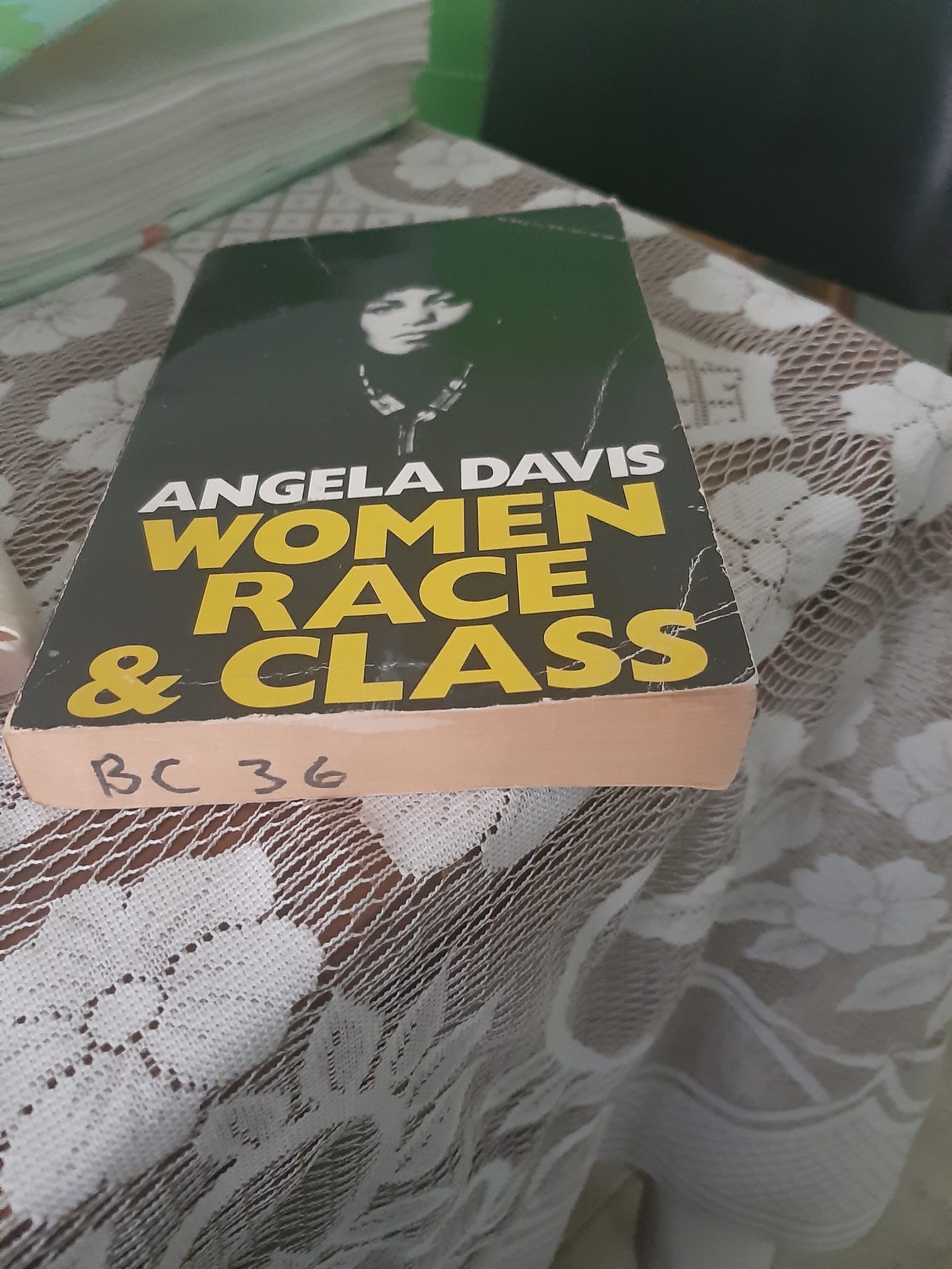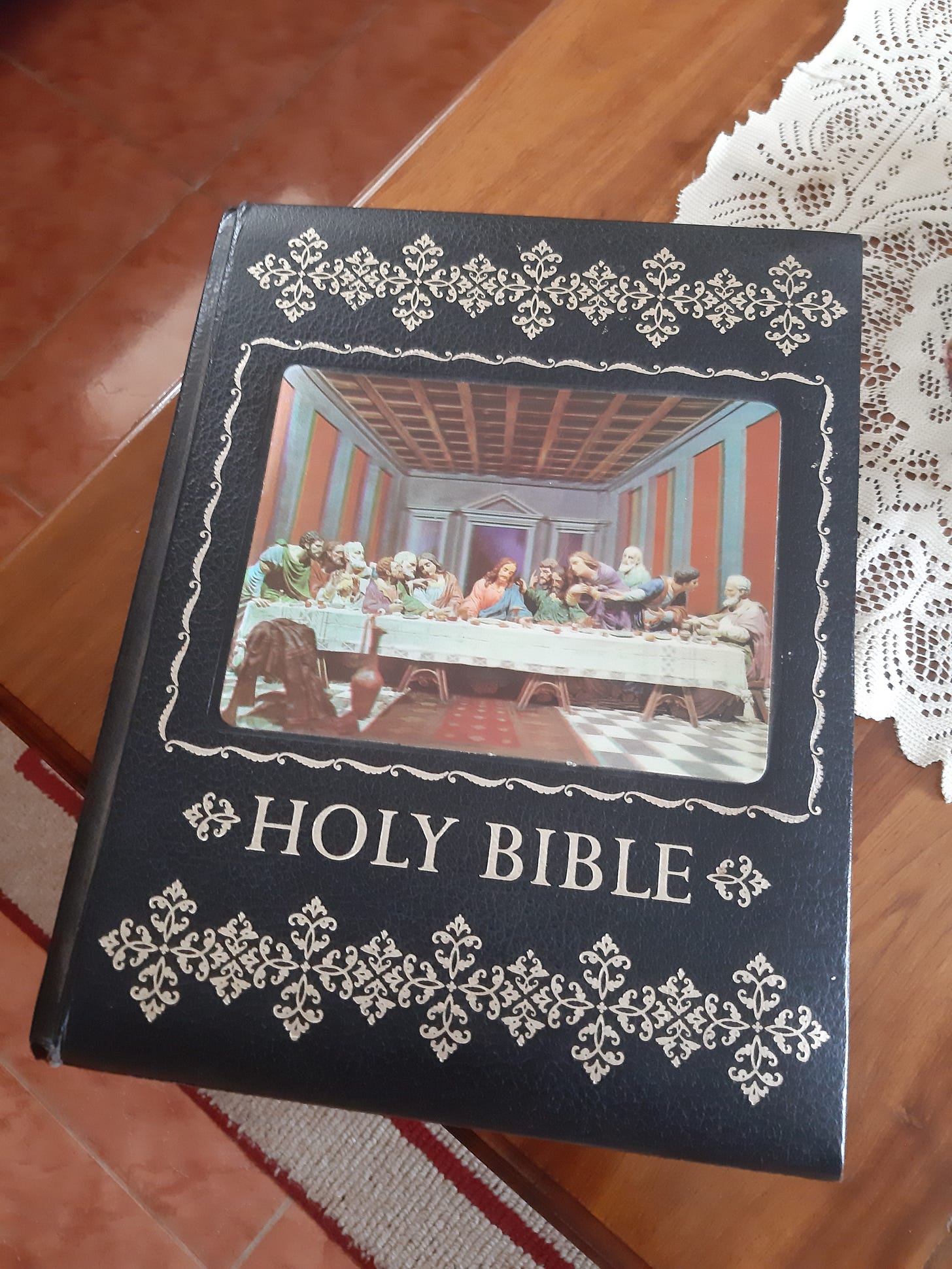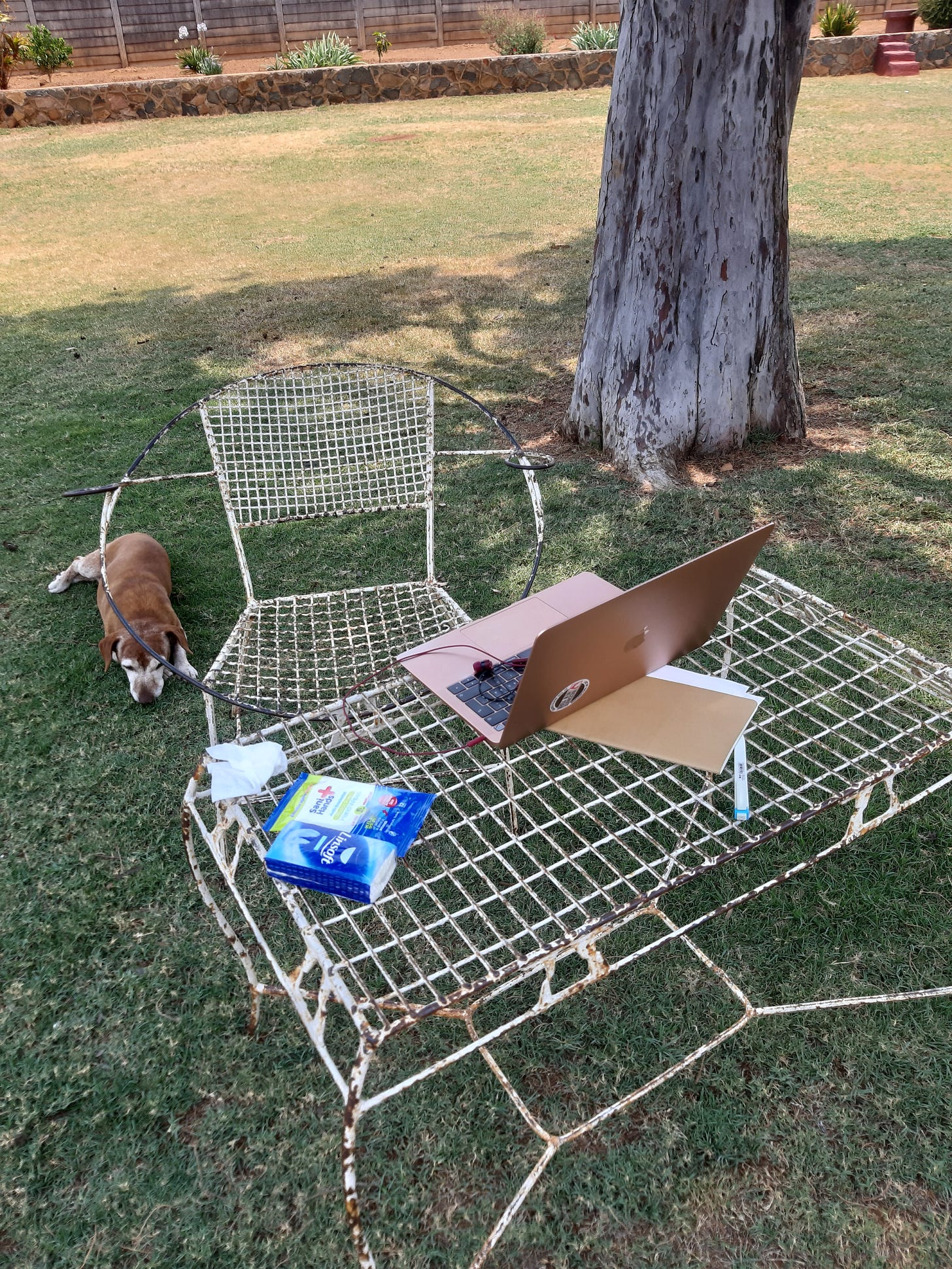All the Books I've Loved Before
and which grew me
November, 2021
An unexpected trip back to Bulawayo, my hometown.
At my childhood home, the days move sleepily along under a blistering expanse of blue sky - a night of fantastic lightening and thunder proves to be all sound and fury. There are roosters crowing, sporadic, animated chatter from the neighbors’ yards, lizards scuttling over the walls, birds chirping, chongololos with their multitude of legs gliding on the stone floors, doves rustling the needles of the ‘bat’ tree, flying out to sit on the electricity wires, Max and Levi, my father’s Jack Russells, sleeping on the strips of shade along the walls.
It is too hot for me to sit under my ‘bat’ tree and read and write, so I retreat to the lounge, and then to my old bedroom. The city council has warned residents that because of the very high temperatures (edging towards 40 degrees celsius) there is an influx of snakes in residential areas - black mambas, pythons, puffaders, spitting cobras - as they seek shelter from the heat, shift a dog basket in the kitchen and…
My bedroom used to be a verandah coming off the lounge - my father walled it in when I was fourteen - my teenage years were terrorized by the bats that would screech and swoop over my head as I slept, flying from one wall to another; they came from the pine tree growing outside my now bedroom; if we forgot to close the windows before nightfall, they would make their way in.
Every time I come home my bedroom has undergone a major change. This time, a massive treadmill has taken over the space. I make a feeble promise to make use of it, to shed those pounds that have made my mum and dad exclaim when they see me that I have become a bit of an isidudla, a fatty.
But my books are always there. They were taken (in 2002) in cardboard boxes by my father at the back of his beaten-down truck from our old home in Harare, when Fabio and I relocated to Switzerland. He acted as a librarian, filing the books on the pine shelves, using his own classification system, labelling them in black marker on the spines. I smile, thinking of him there in my old room, lifting the books from the boxes, classifying them and setting them down gently on the wood, a project.
I scan the three bookshelves lining the walls and then begin my dive to the past -
finding and lifting the books that I have loved as a teenager and as a young woman, books I had bought and read as a schoolgirl in Bulawayo, a university student in Harare, a traveler in Colombia, Barbados, a student in England… years and years of my life, books that pull at me and make my heart flutter with emotion.
In my youth I read relentlessly, swallowed the words, believed in them. Books, the stories they held, enthralled me, so that I could be in sleepy Bulawayo but somewhere else entirely - I could be in Scotland with otters (Ring of Bright Water) or with the assassin in some unnamed European country (Rogue Male). I sensed that they, the language in them, could change me in some fundamental ways. I had been religious as a teenager, until I turned sixteen; I believed in God as my savior, the purpose in my life. When I stopped believing in that, books, what lay in them, filled the void. They contained truths in their fictions, they gave instruction and pleasure. They were escape in solitude.
Hours I would spend on the verandah during school holidays when the white girls would go ‘down south’ for holidays on the beach; there I was on the stone floor between my mother’s elephant ear plants in their clay pots, reading. Reading and household chores, those were my ‘hols’. And writing, which was nurtured by the reading.
Piles of books now grow on the table, plucked by me from the shelves. The pages are yellow with age, and covered in dust and grime which I clean with kitchen towel paper. Some of the pages are stained with water marks, evidence of my reading in the bath. It is emotional this revisiting, this reawakening.
Here are the books that Fabio introduced me to when I was a student in Harare, books that spoke of his days in Rome, Paris and London when he, too, was a student, Camus, The Fall, The Plague, The Outsider; Kafka, The Metamorphosis, The Trial, The Castle and Hermann Hesse, Steppenwolf, Siddhartha. After the long rides on his motorbike, and we were finally ensconced in the cosy National Park cottages in Nyanga or up in Vumba, I would read by the roaring fire, looking up to find, peering at the window, the wide open eyes of an antelope in the clearing mist.
Here is my beloved De Beauvoir - Memoirs of a Dutiful Daughter, She came to Stay and Witness to My Life: The Letters of Jean Paul Sartre to Simone De Beauvoir, edited by Simone de Beauvoir; I devoured De Beauvoir and tried to read Sartre and found him impenetrable but what remained was the idea of contingent lovers that he foisted on De Beauvoir; in my idealism I held onto this idea, this philosophy, when Fabio and I were ‘on a break’ during my last year of university. We would be liberated enough to live our lives in the manner of these two philosophers, free to take on other lovers - it seemed so grown up, so revolutionary. It was a fool’s mission. My Catholic upbringing could not make me a free spirit, not shackled by societal norms, nor could my heart. And it turned out, neither was Fabio. We were bound to each other, just the two of us, for better or worse, in sickness and in health. So, when I look at the volumes of De Beauvoir and Sartre, I think of the young Irene finding herself, the pain and joy that came with that.
My heart leaps when I find the volumes of Maya Angelous. They forged my identity, my self-love as a black woman. Before her, I didn’t quite know who I was, where I fit in, and what I could be. Here she is: writer, performer, traveler, anything she made herself to be. She is The Caged Bird Who Sings and also the woman Singin’ and Swingin’ and Getting Merry Like Christmas. How I have missed her!
And here is Angela Davis: Women, Race and Class. She was the counterpoint to De Beauvoir. A black feminist. A revolutionary. She was my education.
Carol Shields whose death hurt, so soon after I had read Larry’s Party, and the short stories which I found profound and affecting, especially A Scarf.
And here are the Atwoods, Wintersons. And Jorge Amado, whose dense lush stories of Bahia, Brasil I discovered in Colombia, which I would consume during my legendary long baths, back in those youthful days when I did not need reading glasses.
These are the books I have read (and loved) before the age of the internet, social media, when authors to me were gods, or at least anointed by the gods, and their words, books, would capture me, hold me for hours in their spell, their worlds; these are the books that made me want to write, that called out at my soul and told me that I was of that tribe, I had that within me.
On another afternoon I tackle the dresser with its shelf. I find the Family Bible. It is a beautiful volume, full-page copies from the Old Masters illustrating the biblical tales. The heavy Family Bible is precious to me: as a child it was kept tucked away in my parent’s bedroom closet: when they were away I would sneak into their room just to take a look at it. I remember the well-suited Bible salesman, white, very much like an insurance salesman, who came to the house and who sweet-talked my father into investing in that heavy tome. It cost him several monthly payments. I loved that book, with its bright colorful pictures of Jesus, the apostles, its Family Tree, which my mother filled with her delicate hand; we, our family, were in that holy book. My religious young self comes to me. How much I prayed. How much I puzzled over whether thinking bad thoughts was a mortal sin in itself, how much it went round and round in my head - trying to stop a bad thought from being thought… but if you were trying to stop it it meant you had already thought it…
One morning, a completely unexpected and delightful discovery that sweeps me back into the 1980s and my teenage adulation of Lady Di, two books: a Ladybird one
and, Princess: Lady of Fashion.
The book’s glossy pictures of the Princess in all her fashion glory were not enough for me, it seems, for I stuck inside the front cover and on the first four blank pages cutouts from magazines, and from one I can see the date, 1986, the pages from the South African, Fair Lady. The book itself has no publication date or publisher, just a BHS, on its spine. From the pictures of the fresh-faced Diana and a baby William, the book must be from around 1984. I had met Prince Charles, still a bachelor, just four years before, when he came to take the Union Jack back to Britain because Rhodesia was becoming Zimbabwe. Holding the book brings that memory vividly back and I am once again that schoolgirl in April 1980, at the grounds of the Bulawayo City Hall, waving frantically a miniature paper flag (was it the Union Jack or the Rhodesian flag, or the, soon to be, Zimbabwean one?).
Our Form I class had walked up from out Dominican Convent High School on Lobengula Street to the City Hall where we had been given prime spots on the courtyard to welcome the Prince. We were lined up in our school uniforms which included the cap, the bane of our existence, as we were mercilessly teased by other schools when we were caught with it on, bus conductors they called us. The Prince suddenly materialized in front of me; he pointed to my cap, said something, something about it - probably how very jaunty it looked perched there on my plaited hair, just like his; he shook my hand. I walked to the bus stop in a daze; I sat on the bus, just looking, looking, looking at my hand, the hand that had touched a royal hand. I couldn’t believe that that had happened to me. I didn’t wash my hand for two days.
In my mother’s display cabinet, in the lounge, there is royal wedding commemoration mug of Charles and Diana that a friend brought to me from England that year of their wedding. Charles looks exactly like how he looked when he shook my hand that afternoon. I thought he was so dashing in his white uniform, so handsome. At the time there was chatter in the still then Rhodesian press about the Rhodesian beauties who might get to meet the prince, and who might sweep him off his feet and end up a princess. I think he met Miss Rhodesia in some reception.
In the year of Princess Diana and the royal wedding in 1981, I filled three massive scrapbooks, each about one meter wide and across (I don’t know where I found them (Ok Bazaar? Kingston bookshop?), with all things Diana and Charles. It is my eternal regret that, one afternoon, on holiday from university, in a fit of puritanical zeal, I took my three scrapbooks and chucked them in the dustbin. I was at that time a revolutionary, marching at university against capitalism and colonialism - Charles and Diana were imperialist forces that I had to repudiate!
My Prince Charles makes an early appearance in my debut novel, The Boy Next Door
And how could I imagine, that two decades later, I would be invited at a prize giving reception to meet and chat with the very same prince’s second wife, and that the book that went on to win the prize, yes, The Boy Next Door, would feature him on page 6.
Sunday, seven days since I came home, and I am finally seated under the ‘bat’ tree. It is actually a species of pine with very small cones and it is the last remaining tree in the yard: gone is the majestic jacaranda tree that was in the front (shedding too much, the flowers stained the driveway), gone are the thorn trees, one felled by a storm, gone the ‘Christmas tree’ that grew just in front of the verandah which I would decorate with tinsel, gone the syringa because its branches were growing between power lines, gone the palm trees because the root systems were too destructive, gone the mahogany my father planted when we first moved in because the grass underneath its branches would not grow, gone the uxakuxaku, the African bubble gum tree, also known as the snot apple, whose fruit I loved to chew and chew… just my tree remains, still standing stoically; my father will not cut it down because he is happy and full of pride that I have adopted this spot on my visits back home, finding me in the early mornings sitting under it reading, writing, having my morning coffee.
It is a hot day, 34 degrees celsius with only 23 percent humidity, although google has rain predicted, perhaps somewhere else in Bulawayo. There is a slight breeze which brings relief in the shade. It is pleasant to hear music and chatter from the neighbors. Max and Levi rest beside me as I read, write.



















